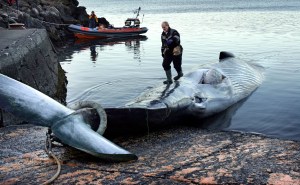
A worker stands on a large fin whale in Hvalfjordur, Iceland, in 2006. (AP)
In the past few days, two pieces of good news have floated to the surface from the morass of Japan’s ongoing nuclear crisis. No, nothing has really improved at Fukushima; in fact, things have turned out to be worse inside Reactor 1 than TEPCO thought. (Read more about that over on Global Spin.)
But! Japan’s Environment ministry, in anticipation of a broiling summer and ongoing electricity shortages with both the Fukushima and Hamaoka nuclear power plants out of commission, has rolled out its “Super Cool Biz” dress code, according to Japan Today. To keep air conditioning at a minimum, the ministry will keep its offices at a toasty 28 C (82 F) and allow its male employees to come to work in t-shirts, polo and “aloha” shirts, jeans and sneakers. That’s a step further than the standard “Cool Biz” dress code, in which workers may only shed jackets and ties.
(Evidently the ministry did not issue a “Super Cool Biz” list of approved work attire for its female employees, which means either a) there are no women working in the environment ministry b) that the women who do work there have to keep wearing pantyhose and suffer in silence or c) that their dress code is by default already Super Cool! Let’s hope it’s c.)
The second piece of trickle-down good news? Because of the disaster, Iceland, apparently, will call off its yearly hunt for fin whales.
In 2006, Iceland broke a global moratorium on commercial whaling and starting hunting fin whales in addition to the minke whales it had been catching under the International Whaling Commission’s loophole of scientific research. (Japan hunts whale under the same loophole each summer in the Antarctic.) Iceland called off its whale hunt in 2007, only to resume again in 2009.
Japan is the biggest consumer of Iceland’s fin whale meat, and three of the facilities that process Icelandic whale meat were destroyed in the March 11 disasters, according to the owner of Iceland’s primary whaling company, Hvalur. According to Iceland Review, Kristjan Loftsson recently went to Japan to assess the situation, and returned saying because of the destroyed facilities and the general mood of austerity in Japan, his company’s fin whale hunt would not begin in June as it normally does. He said it may start later in the summer. Hvalur employs up to 150 people in the summer during whaling season. Fin whales can grow to be nearly 90 feet long and are listed as endangered by the International Union for Conservation of Nature (IUCN).
Unlike Japanese whalers who have been trying (unsuccessfully) to lay low since their much-publicized annual run-ins with the Sea Shepard started, Loftsson has been an outspoken advocate of whaling for his small mid-Atlantic nation. He has been in the business since he was 13, and almost single-handedly lobbied the Icelandic government to return to the industry in 2006. Last year at the IWC meeting in Morocco, Loftsson got anti-whaling activists hackles up when he quoted by AFP as calling whales “just another fish.” When asked what he thought about research indicating that cetaceans are intelligent and sentient animals, he responded: “If they are so intelligent, why don’t they stay outside of Iceland’s territorial waters?”
Riiiiight. I covered Iceland’s return to whaling in 2006 and have spoken to Loftsson quite a few times. Whatever I thought of the way he made his livelihood, I found him to be an interesting man, certainly somebody who doesn’t need to resort to that kind of backed-into-a-corner rhetoric. It makes me wonder whether the constant fight to pursue an industry of yesteryear is finally wearing him down. If that’s the case, this summer, thanks to very unfortunate events on the other side of the planet, it looks like he will get little break after all. And so will the fin whales.


